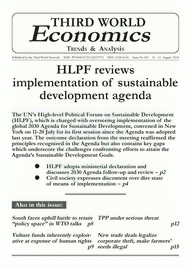Issue
No. 623, 16-31 August 2016
HLPF
reviews implementation of sustainable development agenda

*Click on cover to download (PDF)
HLPF
adopts ministerial declaration and discusses 2030 Agenda follow-up
and review
The
discussions and outcome of the 2016 session of the UN’s sustainable
development forum reflected the challenges involved as countries move
to realize the global 2030 Agenda for Sustainable Development. Bhumika
Muchhala reports.
Civil
society expresses discontent over dire state of means of implementation
Civil society groups at the HLPF stressed the need to remove structural
obstacles impeding implementation of the sustainable development agenda.
by Bhumika Muchhala
South
faces uphill battle to retain “policy space” in WTO talks
Developing countries may come under pressure to cede their policymaking
flexibility in order to make any headway in the deadlocked Doha Round
trade negotiations at the WTO.
by D. Ravi Kanth
Vulture
funds inherently exploitative at expense of human rights
Vulture funds are raking in extravagant profits at the expense of
human rights and development in poor indebted countries, the Advisory
Committee to the UN Human Rights Council has said, underlining the
need to curb the “predatory practices” of these creditors.
by Kanaga Raja
Opinion:
TPP under serious threat
The Trans-Pacific Partnership agreement has become a political football
in the US presidential election campaign, and with the public mood
being against free trade pacts, this deal faces the real possibility
of being discarded.
by Martin Khor
Opinion:
Poverty, vulnerability and social protection
Amid faltering growth rates and limited social protection measures,
economic insecurity and vulnerability have become widespread across
the globe.
by Jomo Kwame Sundaram
Analysis:
New trade deals legalize corporate theft, make farmers’ seeds illegal
A
raft of new bilateral and regional free trade agreements are seeking
to further entrench corporate control of seed supply and restrict
farmers’ ability to save, produce and exchange seeds. The following
article by GRAIN, an international non-profit organization
supporting farmers’ rights, sounds the warning.
